Vesugen 20mg (10 vial kit)
Vesugen 20mg (10 vial kit)
Vesugen, a synthetic peptide bioregulator, improves cardiovascular health by normalizing blood vessel function, offers neuroprotective benefits including memory enhancement, and exhibits anti-aging effects similar to calorie restriction. (PMID: 28539025, PMID: 18546825, PMID: 25051766).
Vesugen Research Topics:
-
Cardiovascular Health:
Vesugen helps normalize the function of blood vessels, which can prevent and treat atherosclerosis and other cardiovascular diseases by improving blood flow and reducing inflammation in the vascular system. This makes it particularly beneficial for conditions like heart disease and stroke. (PMID: 28539025)
-
Neuroprotection:
Vesugen has demonstrated neuroprotective effects, improving memory and restoring synaptic plasticity. This makes it a promising candidate for treating neurodegenerative diseases such as Alzheimer’s by regulating genes related to neuron differentiation and apoptosis. (PMID: 18546825)
-
Anti-Aging Effects:
As an anti-aging peptide, Vesugen mimics some effects of calorie restriction, known to promote longevity. It helps maintain the integrity of the vascular system, contributing to overall health and reducing the signs of aging. (PMID: 25051766)
Structure
Amino Acid Sequence: Lys-Glu-Asp (KEO) Molecular Formula: C1sH2sN4Oa
Molecular Weight: 390.39 g/mol
PubChem CID: 87571363
Synonyms: lysylglutamyl aspartic acid, SCHEMBL3767701, CHEBl:159909

Source: PubChem
Vesugen and the Brain
Vesugen is a promising neuroprotective peptide with potential applications in the treatment of Alzheimer’s disease. Oral administration of the peptide to elderly individuals with functional disorders of the central nervous system (CNS) has resulted in improved memory in past experiments. The peptide has also been shown to restore synaptic plasticity, which is to say the ability of neurons to make and strengthen connections between themselves [1].
Like most bioregulatory peptides, Vesugen appears to regulate the expression of genes involved in apoptosis and neuron differentiation. Research shows that Vesugen has an impact on the genes for p16, p21, NES, GAP43, nestin, SUMO, APOE, and IGFl. Some of these peptides are involved in apoptosis (programmed cell death) of neurons while others are involved in neuron growth or have been shown to play a role in Alzheimer’s disease pathogenesis [1].
Research also shows that peptides like Vesugen, Epitalon, Pinealon, and Violon can reduce the effects of hypoxia (oxygen deprivation) in the central nervous system. They appear to do this by boosting anti-oxidative enzyme levels and thus helping to counteract the increase in neurotoxic reactive oxygen species that occurs when oxygen levels decline [2]. According to Dr. Linkova, a Russian specialist in aging and gerontology, this effect of Vesugen could not only be useful in the setting of hypoxic events like stroke or heart attack but also in the setting of neonatal hypoxia during birth.
Vesugen and Blood Vessels
At least part of the reason that Vesugen protects the central nervous system comes down to the fact that it protects blood vessels from the clogging effects of atherosclerosis and therefore serves to maintain both the supply of nutrients to various tissues as well as the removal of waste products. The latter may be more important in long-term brain health given that research has shown the brain to produce high amounts of metabolic by-products that, if not removed promptly, can be toxic to neurons. Having a robust blood supply helps to ensure neurons remain in a healthy environment. The bulk (though not all) of Vesugen’s geroprotective effects may boil down to its impact on vascular health.
Research shows that Vesugen is effective in the treatment of atherosclerosis and other cardiovascular disorders, particularly in older individuals. It affects the expression of genes responsible for endothelial regulation and health. Endothelial cells are the cells that line the insides of blood vessels. Research in mice shows that Vesugen prevents the development of atherosclerosis and vascular stenosis (narrowing due to endothelial overgrowth) by normalizing endothelin-1 expression and increasing sirtuin-1 expression [3]. Sirtuin helps to prevent lipid production and stimulates the oxidation (burning) of fatty acids by altering transcription factors and thus controlling large numbers of genes. Research shows that it contributes to longevity, which means that Vesugen is, at least indirectly, an anti-aging peptide.
The ability of Vesugen to prevent lipid peroxidation (a process that is different from oxidation) increases the stability of red blood cell membranes, which stabilizes the vasculature. This leads to a decrease in the percent of dead cells circulating through blood vessels (especially in the central nervous system) and may serve to reduce rates of apoptosis/necrosis [4].
Additional research reveals that Vesugen stimulates proliferation-associated protein Ki-67 in blood vessels and that levels of Vesugen naturally decline with age [5]. This would suggest that at least part of the reason that rates of vascular disease rise with age is not because of diet or environmental exposure, but simply because these cells start to lose protective mechanisms as Vesugen levels decline. Supplementation with Vesugen, which is orally active, could help to prevent this age-related decline.
Vesugen and Diabetes
Vesugen, as pointed out in the section on blood vessel health, activates sirtuin-1, which has been shown to play an important role in insulin sensitivity. Research in mice shows that activation of sirtuin-1 by compounds like Vesugen or the antioxidant resveratrol increases insulin sensitivity and helps attenuate the insulin resistance caused by eating a high-fat diet [6].
In addition to helping to regulate insulin sensitivity, sirtuin 1 has also been shown to affect the activity of PGC1-alpha and the ERR-alpha complex. These proteins are important regulators of large components of the metabolic pathway. Regulation of these pathways helps to improve overall metabolism and fight off the development of metabolic syndrome [7],[8].
Vesugen and Addiction
Research shows that sirtuin 1 is part of a large complex of proteins that regulate the D1-type of dopaminergic spiny neurons in the central nervous system. These neurons are important in the pathogenesis of addiction. These neurons play important roles in motivation, reward, and habit formation. Dysfunction of these systems is linked to addiction and schizophrenia as well as Parkinson’s disease. The ability to regulate their function may provide important new tools in the treatment of various psychiatric and neurological disorders.
Vesugen and Aging
It has long been known that caloric restriction is a highly effective means of prolonging life. Research suggests that calorie restriction may have the single largest impact on the longevity of anything discovered to date. What is unclear, however, is exactly how calorie restriction produces this effect.
At least part of the answer, it appears, comes down to changes in patterns of protein expression. Research shows that increases in sirtuin-1 that result from calorie restriction result in deactivation of the p53 protein. Down-regulation of p53 function helps to slow the rate of apoptosis, which means that cells survive for longer. This is critical in tissue where cells are either slowly replaced (cardiac tissue) or are not replaced at all (neurons).
In addition, sirtuin-1 also stimulates the process of autophagy [9]. Autophagy is an important component of tissue health in which cellular components are recycled and renewed. This leads to improved functionality of cells and decreases the presence of waste materials and debris.
Overall, the activation of sirtuin-1 helps to improve cell and tissue health both by helping cells with regular housekeeping duties and by prolonging survival. This effect can be achieved via fasting or calorie restriction, but these practices are not easy to maintain over a lifetime. Dr. Vladimir Khavinson, considered to be the father of bioregulator peptide investigation, Vesugen has the same effect as calorie restriction. Thus, the peptide may be a suitable alternative to achieving the effects of calorie restriction without actually restricting calories.
Research on Vesugen indicates that it is, indeed, an anti-aging peptide. Administration of Vesugen to adults with polymorbidity and organic brain syndrome shows that the peptide has significant anabolic (tissue and cell building) effects. These anabolic effects lead to improved activity both in the central nervous system and throughout the body. Measurement of biological indicators of age reveals an overall slowing of the rate of aging in this setting. In some ways, Vesugen shows more potent geroprotective effects than the vaunted Pinealon peptide [10]. The two peptides are likely synergistic when administered in combination.
Vesugen Summary
Vesugen is a bioregulator and geroprotective tripeptide. It protects the vascular system from the effects of aging by limiting the development of atherosclerosis and decreasing overall endothelial cell dysfunction. Systems that are sensitive to vascular damage and decline therefore show the most obvious effects from Vesugen administration. These systems include the central nervous system and cardiovascular system. Vesugen appears to play a prominent role in regulating sirtuin-1 protein levels. Sirtuin-1 has important effects on metabolic processes and helps to reduce the effects of aging. Sirtuin-1 is activated as a result of calorie restriction and is therefore thought to be one of the proteins responsible for the profound anti-aging effects associated with calorie restriction.
Article Author
The above literature was researched, edited, and organized by Dr. Logan, M.D. Dr. Logan holds a doctorate from Case Western Reserve University School of Medicine and a B.S. in molecular biology.
Scientific Journal Author
Vladimir Khavinson is a Professor, resident of the European region of the International Association of Gerontology and Geriatrics; Member of the Russian and Ukrainian Academies of Medical Sciences; Main gerontologist of the Health Committee of the Government of Saint Petersburg, Russia; Director of the Saint Petersburg Institute of Bioregulation and Gerontology; Vice president of Gerontological Society of the Russian Academy of Sciences; Head of the Chair of Gerontology and Geriatrics of the North-Western State Medical University, St-Petersburg; Colonel of medical service (USSR, Russia), retired. Vladimir Khavinson is known for the discovery, experimental, and clinical studies of new classes of peptide bioregulators as well as for the development of bioregulating peptide therapy. He is engaged in studying the role of peptides in the regulation of the mechanisms of ageing. His main field of action is the design, pre-clinical, and clinical studies of new peptide geroprotectors. A 40-year investigation resulted in a multitude of methods of application of peptide bioregulators to slow down the process of aging and increase human life span. Six peptide-based pharmaceuticals and 64 peptide food supplements have been introduced into clinical practice by V. Khavinson. He is an author of 196 patents (Russian and international) as well as of 775 scientific publications. His major achievements are presented in two books: “Peptides and Ageing” (NEL, 2002) and “Gerontological Aspects of Genome Peptide Regulation” (Karger AG, 2005). Vladimir Khavinson introduced the scientific specialty “Gerontology and Geriatrics” in the Russian Federation on the governmental level. Academic Council headed by V. Khavinson has oversight over 200 Ph.D. and Doctorate theses from many different countries.
Prof. Vladimir Khavinson is being referenced as one of the leading scientists involved in the research and development of Vesugen. In no way is this doctor/scientist endorsing or advocating the purchase, sale, or use of this product for any reason. There is no affiliation or relationship, implied or otherwise, between Life Link Research and this doctor. The purpose of citing the doctor is to acknowledge, recognize, and credit the exhaustive research and development efforts conducted by the scientists studying this peptide.
Referenced Citations
- V. K. Khavinson, N. S. Lin’kova, and R. S. Umnov, “Peptide KED: Molecular-Genetic Aspects of Neurogenesis Regulation in Alzheimer’s Disease,” Bull. Exg Biol. Med., vol. 171, no. 2,_RR- 190-193, May. 2021, doi: 10.1007 ls10517-021-05192-6.
- L. S. Kozina, “[Investigation of antihypoxic ” properties of short peptides],’ Adv. Gerontol Useekhi Gerontol., vol. 21, no. 1, pp- 61-67, 2008.
- K. L. Kozlov et al., “[Molecular aspects of vasoprotective peptide KED activity during atherosclerosis and restenosis],” Adv. Gerontol. Useekhi Gerontol., vol. 29, no. 4, pp. 646-650, 2016.
- L. S. Kozina, A. V. Arutiunian, S. L. StvolinskiT, and V. K. Khavinson, “[Biological activity. of regulatory peptides in model experiments in vitro],” Adv. Gerontol. Useekhi Gerontol., vol. 21, no. 1, pp. 68-73, 2008.
- V. K. Khavinson, S. I. Tarnovskaia, N. S. Lin’kova, E. o. Guton, and E. V. Elashkina :[Epigenetic aspects of peptidergic regulation of vascular endothelial cell proliferation during aging],” Adv. Gerontol. Uspekhi Gerontol., vol. 27, no. 1, pp. 108-114,2014.
- C. Sun et al., “SIRT1 improves insulin sensitivity under insulin-resistant conditions by repressing PTP1B,” Cell Metab., vol. 61 no. 4 pp. 307-319, Oct. 2007, doi: 10.1016lj.cmet.2007.08.014.
- S. Nemoto, M. M. Fergusson, and T. Finkel, “SIRT1 functionally interacts with the metabolic regulator and transcriptional coactivator PGC-1{alpha},” J. Biol. Chem., vol. 280, no. 16,_pp. 16456-16460, Apr. 2005,. doi: 10.107 4ljbc. M501485200.
- M. Lagouge et al., “Resveratrol improves mitochondrial function and protects against metabolic disease by activating SIRT1 and PGC-1a1pha,” Cell, vol. 127, no. 6, pp. 1109- 1122, Dec. 2006, doi: 10.1016lj.cell.2006.11.013.
- I. H. Lee et al., “A role for the NAO-dependent deacetylase Sirt1 in the regulation of autophagy,” Proc. Natl. A cad. Sci. U. S. A., vol. 105, no. 9, pp. 3374-3379, Mar. 2008, doi: 10.1073lpnas.0712145105.
- V. N. Meshchaninov, E. L. Tkachenko, S. V. Zharkov, I. V. Gavrilov, and I. E. Katyreva, “[EFFECT OF SYNTHETIC PEPTIDES ON AGING OF PATIENTS WITH CHRONIC POLYMORBIDITY AND ORGANIC BRAIN SYNDROME OF THE CENTRAL NERVOUS SYSTEM IN REMISSION],” Adv. Gerontol. Uspekhi Gerontol .• vol. 28, no. 1, pp.’E9P, 2015.
$470.00
Description
Vesugen, a synthetic peptide bioregulator, improves cardiovascular health by normalizing blood vessel function, offers neuroprotective benefits including memory enhancement, and exhibits anti-aging effects similar to calorie restriction. (PMID: 28539025, PMID: 18546825, PMID: 25051766).
Vesugen Research Topics:
-
Cardiovascular Health:
Vesugen helps normalize the function of blood vessels, which can prevent and treat atherosclerosis and other cardiovascular diseases by improving blood flow and reducing inflammation in the vascular system. This makes it particularly beneficial for conditions like heart disease and stroke. (PMID: 28539025) -
Neuroprotection:
Vesugen has demonstrated neuroprotective effects, improving memory and restoring synaptic plasticity. This makes it a promising candidate for treating neurodegenerative diseases such as Alzheimer’s by regulating genes related to neuron differentiation and apoptosis. (PMID: 18546825) -
Anti-Aging Effects:
As an anti-aging peptide, Vesugen mimics some effects of calorie restriction, known to promote longevity. It helps maintain the integrity of the vascular system, contributing to overall health and reducing the signs of aging. (PMID: 25051766)
Structure
Amino Acid Sequence: Lys-Glu-Asp (KEO) Molecular Formula: C1sH2sN4Oa
Molecular Weight: 390.39 g/mol
PubChem CID: 87571363
Synonyms: lysylglutamyl aspartic acid, SCHEMBL3767701, CHEBl:159909

Source: PubChem
Vesugen and the Brain
Vesugen is a promising neuroprotective peptide with potential applications in the treatment of Alzheimer’s disease. Oral administration of the peptide to elderly individuals with functional disorders of the central nervous system (CNS) has resulted in improved memory in past experiments. The peptide has also been shown to restore synaptic plasticity, which is to say the ability of neurons to make and strengthen connections between themselves [1].
Like most bioregulatory peptides, Vesugen appears to regulate the expression of genes involved in apoptosis and neuron differentiation. Research shows that Vesugen has an impact on the genes for p16, p21, NES, GAP43, nestin, SUMO, APOE, and IGFl. Some of these peptides are involved in apoptosis (programmed cell death) of neurons while others are involved in neuron growth or have been shown to play a role in Alzheimer’s disease pathogenesis [1].
Research also shows that peptides like Vesugen, Epitalon, Pinealon, and Violon can reduce the effects of hypoxia (oxygen deprivation) in the central nervous system. They appear to do this by boosting anti-oxidative enzyme levels and thus helping to counteract the increase in neurotoxic reactive oxygen species that occurs when oxygen levels decline [2]. According to Dr. Linkova, a Russian specialist in aging and gerontology, this effect of Vesugen could not only be useful in the setting of hypoxic events like stroke or heart attack but also in the setting of neonatal hypoxia during birth.
Vesugen and Blood Vessels
At least part of the reason that Vesugen protects the central nervous system comes down to the fact that it protects blood vessels from the clogging effects of atherosclerosis and therefore serves to maintain both the supply of nutrients to various tissues as well as the removal of waste products. The latter may be more important in long-term brain health given that research has shown the brain to produce high amounts of metabolic by-products that, if not removed promptly, can be toxic to neurons. Having a robust blood supply helps to ensure neurons remain in a healthy environment. The bulk (though not all) of Vesugen’s geroprotective effects may boil down to its impact on vascular health.
Research shows that Vesugen is effective in the treatment of atherosclerosis and other cardiovascular disorders, particularly in older individuals. It affects the expression of genes responsible for endothelial regulation and health. Endothelial cells are the cells that line the insides of blood vessels. Research in mice shows that Vesugen prevents the development of atherosclerosis and vascular stenosis (narrowing due to endothelial overgrowth) by normalizing endothelin-1 expression and increasing sirtuin-1 expression [3]. Sirtuin helps to prevent lipid production and stimulates the oxidation (burning) of fatty acids by altering transcription factors and thus controlling large numbers of genes. Research shows that it contributes to longevity, which means that Vesugen is, at least indirectly, an anti-aging peptide.
The ability of Vesugen to prevent lipid peroxidation (a process that is different from oxidation) increases the stability of red blood cell membranes, which stabilizes the vasculature. This leads to a decrease in the percent of dead cells circulating through blood vessels (especially in the central nervous system) and may serve to reduce rates of apoptosis/necrosis [4].
Additional research reveals that Vesugen stimulates proliferation-associated protein Ki-67 in blood vessels and that levels of Vesugen naturally decline with age [5]. This would suggest that at least part of the reason that rates of vascular disease rise with age is not because of diet or environmental exposure, but simply because these cells start to lose protective mechanisms as Vesugen levels decline. Supplementation with Vesugen, which is orally active, could help to prevent this age-related decline.
Vesugen and Diabetes
Vesugen, as pointed out in the section on blood vessel health, activates sirtuin-1, which has been shown to play an important role in insulin sensitivity. Research in mice shows that activation of sirtuin-1 by compounds like Vesugen or the antioxidant resveratrol increases insulin sensitivity and helps attenuate the insulin resistance caused by eating a high-fat diet [6].
In addition to helping to regulate insulin sensitivity, sirtuin 1 has also been shown to affect the activity of PGC1-alpha and the ERR-alpha complex. These proteins are important regulators of large components of the metabolic pathway. Regulation of these pathways helps to improve overall metabolism and fight off the development of metabolic syndrome [7],[8].
Vesugen and Addiction
Research shows that sirtuin 1 is part of a large complex of proteins that regulate the D1-type of dopaminergic spiny neurons in the central nervous system. These neurons are important in the pathogenesis of addiction. These neurons play important roles in motivation, reward, and habit formation. Dysfunction of these systems is linked to addiction and schizophrenia as well as Parkinson’s disease. The ability to regulate their function may provide important new tools in the treatment of various psychiatric and neurological disorders.
Vesugen and Aging
It has long been known that caloric restriction is a highly effective means of prolonging life. Research suggests that calorie restriction may have the single largest impact on the longevity of anything discovered to date. What is unclear, however, is exactly how calorie restriction produces this effect.
At least part of the answer, it appears, comes down to changes in patterns of protein expression. Research shows that increases in sirtuin-1 that result from calorie restriction result in deactivation of the p53 protein. Down-regulation of p53 function helps to slow the rate of apoptosis, which means that cells survive for longer. This is critical in tissue where cells are either slowly replaced (cardiac tissue) or are not replaced at all (neurons).
In addition, sirtuin-1 also stimulates the process of autophagy [9]. Autophagy is an important component of tissue health in which cellular components are recycled and renewed. This leads to improved functionality of cells and decreases the presence of waste materials and debris.
Overall, the activation of sirtuin-1 helps to improve cell and tissue health both by helping cells with regular housekeeping duties and by prolonging survival. This effect can be achieved via fasting or calorie restriction, but these practices are not easy to maintain over a lifetime. Dr. Vladimir Khavinson, considered to be the father of bioregulator peptide investigation, Vesugen has the same effect as calorie restriction. Thus, the peptide may be a suitable alternative to achieving the effects of calorie restriction without actually restricting calories.
Research on Vesugen indicates that it is, indeed, an anti-aging peptide. Administration of Vesugen to adults with polymorbidity and organic brain syndrome shows that the peptide has significant anabolic (tissue and cell building) effects. These anabolic effects lead to improved activity both in the central nervous system and throughout the body. Measurement of biological indicators of age reveals an overall slowing of the rate of aging in this setting. In some ways, Vesugen shows more potent geroprotective effects than the vaunted Pinealon peptide [10]. The two peptides are likely synergistic when administered in combination.
Vesugen Summary
Vesugen is a bioregulator and geroprotective tripeptide. It protects the vascular system from the effects of aging by limiting the development of atherosclerosis and decreasing overall endothelial cell dysfunction. Systems that are sensitive to vascular damage and decline therefore show the most obvious effects from Vesugen administration. These systems include the central nervous system and cardiovascular system. Vesugen appears to play a prominent role in regulating sirtuin-1 protein levels. Sirtuin-1 has important effects on metabolic processes and helps to reduce the effects of aging. Sirtuin-1 is activated as a result of calorie restriction and is therefore thought to be one of the proteins responsible for the profound anti-aging effects associated with calorie restriction.
Article Author
The above literature was researched, edited, and organized by Dr. Logan, M.D. Dr. Logan holds a doctorate from Case Western Reserve University School of Medicine and a B.S. in molecular biology.
Scientific Journal Author
Vladimir Khavinson is a Professor, resident of the European region of the International Association of Gerontology and Geriatrics; Member of the Russian and Ukrainian Academies of Medical Sciences; Main gerontologist of the Health Committee of the Government of Saint Petersburg, Russia; Director of the Saint Petersburg Institute of Bioregulation and Gerontology; Vice president of Gerontological Society of the Russian Academy of Sciences; Head of the Chair of Gerontology and Geriatrics of the North-Western State Medical University, St-Petersburg; Colonel of medical service (USSR, Russia), retired. Vladimir Khavinson is known for the discovery, experimental, and clinical studies of new classes of peptide bioregulators as well as for the development of bioregulating peptide therapy. He is engaged in studying the role of peptides in the regulation of the mechanisms of ageing. His main field of action is the design, pre-clinical, and clinical studies of new peptide geroprotectors. A 40-year investigation resulted in a multitude of methods of application of peptide bioregulators to slow down the process of aging and increase human life span. Six peptide-based pharmaceuticals and 64 peptide food supplements have been introduced into clinical practice by V. Khavinson. He is an author of 196 patents (Russian and international) as well as of 775 scientific publications. His major achievements are presented in two books: “Peptides and Ageing” (NEL, 2002) and “Gerontological Aspects of Genome Peptide Regulation” (Karger AG, 2005). Vladimir Khavinson introduced the scientific specialty “Gerontology and Geriatrics” in the Russian Federation on the governmental level. Academic Council headed by V. Khavinson has oversight over 200 Ph.D. and Doctorate theses from many different countries.
Prof. Vladimir Khavinson is being referenced as one of the leading scientists involved in the research and development of Vesugen. In no way is this doctor/scientist endorsing or advocating the purchase, sale, or use of this product for any reason. There is no affiliation or relationship, implied or otherwise, between Life Link Research and this doctor. The purpose of citing the doctor is to acknowledge, recognize, and credit the exhaustive research and development efforts conducted by the scientists studying this peptide.
Referenced Citations
- V. K. Khavinson, N. S. Lin’kova, and R. S. Umnov, “Peptide KED: Molecular-Genetic Aspects of Neurogenesis Regulation in Alzheimer’s Disease,” Bull. Exg Biol. Med., vol. 171, no. 2,_RR- 190-193, May. 2021, doi: 10.1007 ls10517-021-05192-6.
- L. S. Kozina, “[Investigation of antihypoxic ” properties of short peptides],’ Adv. Gerontol Useekhi Gerontol., vol. 21, no. 1, pp- 61-67, 2008.
- K. L. Kozlov et al., “[Molecular aspects of vasoprotective peptide KED activity during atherosclerosis and restenosis],” Adv. Gerontol. Useekhi Gerontol., vol. 29, no. 4, pp. 646-650, 2016.
- L. S. Kozina, A. V. Arutiunian, S. L. StvolinskiT, and V. K. Khavinson, “[Biological activity. of regulatory peptides in model experiments in vitro],” Adv. Gerontol. Useekhi Gerontol., vol. 21, no. 1, pp. 68-73, 2008.
- V. K. Khavinson, S. I. Tarnovskaia, N. S. Lin’kova, E. o. Guton, and E. V. Elashkina :[Epigenetic aspects of peptidergic regulation of vascular endothelial cell proliferation during aging],” Adv. Gerontol. Uspekhi Gerontol., vol. 27, no. 1, pp. 108-114,2014.
- C. Sun et al., “SIRT1 improves insulin sensitivity under insulin-resistant conditions by repressing PTP1B,” Cell Metab., vol. 61 no. 4 pp. 307-319, Oct. 2007, doi: 10.1016lj.cmet.2007.08.014.
- S. Nemoto, M. M. Fergusson, and T. Finkel, “SIRT1 functionally interacts with the metabolic regulator and transcriptional coactivator PGC-1{alpha},” J. Biol. Chem., vol. 280, no. 16,_pp. 16456-16460, Apr. 2005,. doi: 10.107 4ljbc. M501485200.
- M. Lagouge et al., “Resveratrol improves mitochondrial function and protects against metabolic disease by activating SIRT1 and PGC-1a1pha,” Cell, vol. 127, no. 6, pp. 1109- 1122, Dec. 2006, doi: 10.1016lj.cell.2006.11.013.
- I. H. Lee et al., “A role for the NAO-dependent deacetylase Sirt1 in the regulation of autophagy,” Proc. Natl. A cad. Sci. U. S. A., vol. 105, no. 9, pp. 3374-3379, Mar. 2008, doi: 10.1073lpnas.0712145105.
- V. N. Meshchaninov, E. L. Tkachenko, S. V. Zharkov, I. V. Gavrilov, and I. E. Katyreva, “[EFFECT OF SYNTHETIC PEPTIDES ON AGING OF PATIENTS WITH CHRONIC POLYMORBIDITY AND ORGANIC BRAIN SYNDROME OF THE CENTRAL NERVOUS SYSTEM IN REMISSION],” Adv. Gerontol. Uspekhi Gerontol .• vol. 28, no. 1, pp.’E9P, 2015.




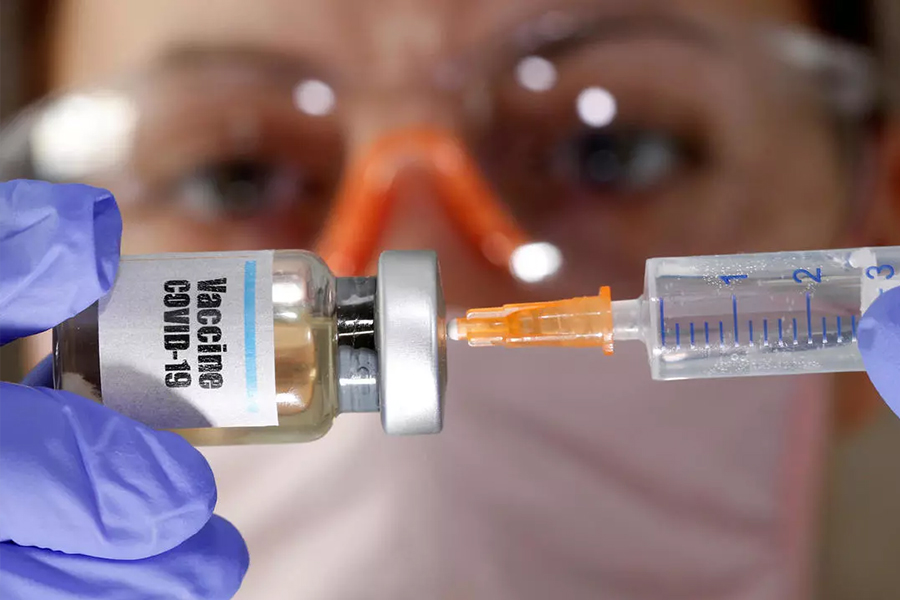


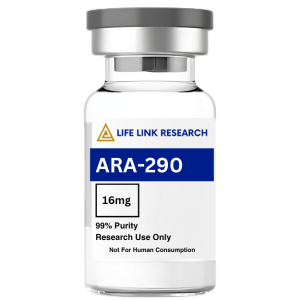
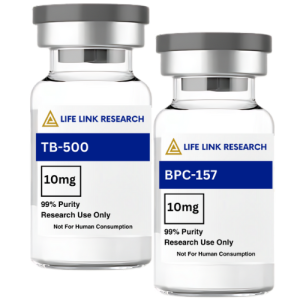
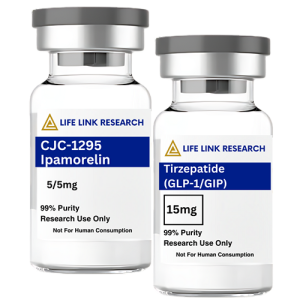
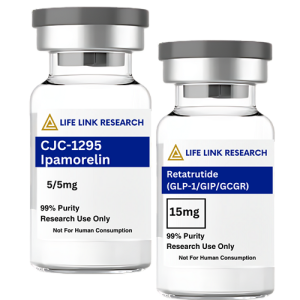
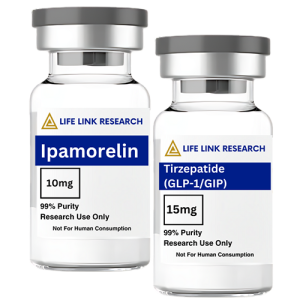
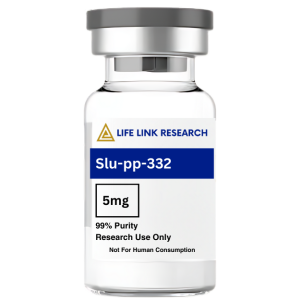


Reviews
There are no reviews yet.